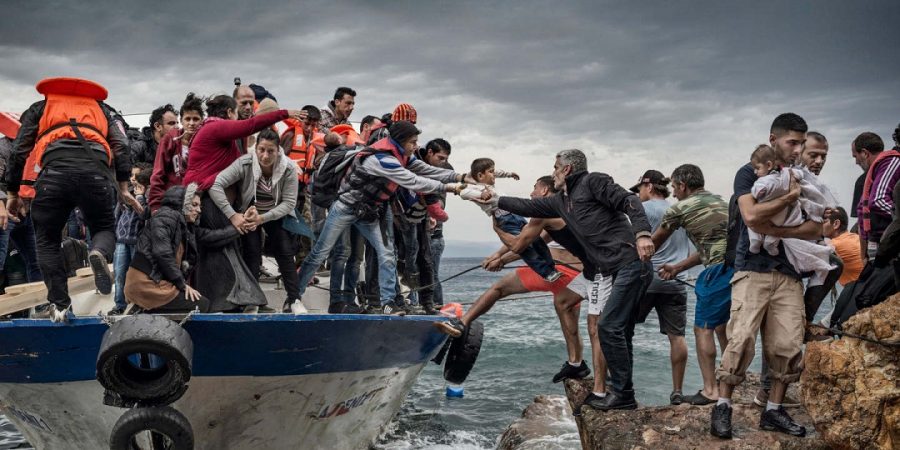Opinion: The Refugee Crisis
You may have heard about the massive amounts of people being displaced around the world right now and before we get into specifics, this article will focus on refugees from areas in the Middle East and Africa.
According to the UN (United Nations) a refugee is someone who “has been forced to flee his or her country because of persecution, war, or violence.” The majority of refugees come from five countries, Myanmar, South Sudan, Somalia, Syria, and Afghanistan. There are 25.9 million refugees world wide and over 70 million that are displaced as either refugees, asylum seekers, or the internally displaced (those who had to leave their home but never left their country’s borders). The countries that take in the most refugees are Turkey, Pakistan, Jordan, Lebanon, Uganda, and Germany.
The large amount of people are going to lead to some obvious problems. They need a place to stay, food to eat, clothes, and a way to assimilate into the country they move to. There has also been a rising trend of hostility to refugees, even in our own school. I remember last year in my English class my teacher would allow us to have small debates. I convinced her to allow a debate on whether or not we should allow refugees into America. I was the only person arguing on the ‘yes’ side. Most were on the ‘no’ side and we also had a few in the middle who didn’t believe they knew enough or didn’t have an opinion. Though this was just one class of 9th graders in a rather small school, I think it’s a good example of a growing trend.
We always hear the same things: they’ll steal jobs, their culture/religion won’t allow them to assimilate, and how do we know if they’re dangerous if they’re strangers? There is a degree of misinformation.
Jobs go to those who the company sees as the most qualified, and if they’re really worried about jobs they should target robots taking over jobs like assembly lines and store checkouts. A lot of people have noticed the dislike and fear of Muslims and people from Muslim majority countries growing since the events of 9/11, but a lot of it is based off of misinformation. Some even believe that Muslims hate Jews and Christians, but it specifically says that “People of the book,” or anyone who worships the god of Abraham, would have no fear on judgment day (Qur’an 3:16-71). Of course there’s always people who twist scripture to fit their own ideals and justify violence against those they dislike, but that isn’t Islam specific.
If Islam was a naturally violent religion we would have a lot more problems than we do. It’s the largest religion in the world. The country with the largest Muslim population is Malaysia, but when people think of Islamic extremism, they often think of countries like Afghanistan or Iraq. The consistent factor is an unstable country; violent places create violent people.
The biggest fear for many comes from not knowing who’s coming in to the country. In Europe they have a few problems with desperate people traveling the Mediterranean Sea on overpopulated rafts and showing up on beaches, but we have no chance of having that problem here in the US. The US has a lengthy six stage vetting process for any refugee that wishes to enter the country.
- Any people who wish to seek refugee status in the United States must go through the UN’s refugee programs that do background checks and an in depth assessment before being sent onto US soil.
- They do pre-screenings to be able to apply for resettlement.
- US security agents do a screening and a biographic security check.
- The Department of Homeland Security does personal interviews and collects fingerprints.
- US authorities do even more security screenings.
- If refugees make it to the final stage, they must attend cultural orientation classes and the resettlement agency determines where they will start their new life.
It’s a very rigorous process that often takes years to get through. People aren’t just going through it because they feel like it. This isn’t “90 day Fiance,” they go through it because their life is in danger where they came from. Refugees are some of the most vulnerable people in our society. I’d like to see more people open up to welcome them. We are a nation of immigrants and, though we have had our low moments in the past, the United States has been a strong safe haven for those who needed it in the past. Let’s keep it that way.
Works Cited
“An Overview of U.S. Refugee Law and Policy.” American Immigration Council, 8 Jan. 2020, www.americanimmigrationcouncil.org/research/overview-us-refugee-law-and-policy.
“Refugees.” United Nations, United Nations, www.un.org/en/sections/issues-depth/refugees/.
“UNHCR Afghan Refugee Statistics 10 Sep 2001 / United Nations High Commissioner Fro Refugees (UNHCR).” 2001, doi:10.2458/azu_acku_pamphlet_hv640_4_a28_u643_2001.
“What Is a Refugee? Definition and Meaning: USA for UNHCR.” Definition and Meaning | USA for UNHCR, www.unrefugees.org/refugee-facts/what-is-a-refugee/.

Breanna is one of our most active writers. She enjoys writing articles about politics and world events. She also participates in Impressions, Chamber Singers,...

